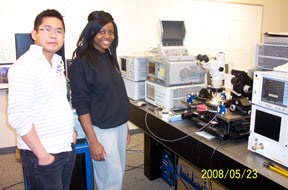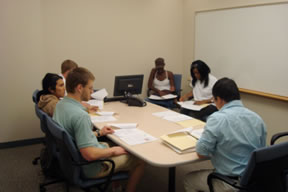

2008 Report
Introduction // Beijing // Chengdu // Conclusion
Full Report:
2008_IRES_report (pdf - 6.38 MB)
SCCUCR_poster.pdf (pdf - 548 KB)
Students
Robert "Mike" Ballou
Robert Lu
Israel Ramirez
Margaret Ukwu
Background
In the past decade technology has always been the foundation of the China. More and more advanced technology development in China has contributed to its economic growth for the past few decades. It is necessary for those engaging in engineering field to have international experiences in their early stage of career.
Sponsored by NSF (National Science Foundation) under IRES (International Research Experience for Students) Program, Professor Albert Wang in UCR (University of California, Riverside) is holding a three-year program, recruiting students mostly from UC campus to have international internship experiences in China. Each year, four candidates will be selected from the pool and be granted with all the cost of traveling.
Under the connection between Dr. Wang and the universities in China, this program facilitated each student to overcome the possible cultural differences between Asian and Western culture. Furthermore, this program also provided all kinds of possibilities to explore the profound depth of Chinese culture in Foods, living, life style, and cultural values.
In 2008, four candidates from UCR were selected: Israel Ramirez, Mike Ballou, Margaret Ukwu, and Robert Lu. This internship took place in Tsinghua University and the University of Electronic Science and Technology of China (UESTC) for three weeks respectively.
Goals
- To expose the selected students to a highly competent microelectronics research environment in China for unique research experience under international collaboration.
- To cultivate all selected students to properly appreciates the all kinds of exotic foods, clothing, and values in a foreign environment.
- To develop independent and critical thinking when confronting unexpected scenarios and conflicts in China
- To offer a unique chance for local students in China to directly experience different cultural source from US
- To increase the mutual understating between the students in China and America
- To develop all selected students an open-minded attitude in dealing with foreign environments.
- To spur a positive attitude for students from both sides to accept different ideas outside their country
- To let all selected students have the first contact with local people and gather unique life experience.
Pre-Departure
Technical Orientation
As part of the program, we were required to attend a two-week program at Professor’s Wang laboratory, LICS, Laboratory for Integrated Circuits and Systems. In the lab, we had the opportunity to familiarize with the tools and the vocabulary used in research. Lin Lin, a graduate student in LICS led the technical orientation. We had hand-on-experience with equipment used on the testing of semiconductors. We were able to use the oscilloscope and explore the different functions.

Figure P.1: Robert and Margaret
familiarizing with the equipment used in
research.
We all found this technical orientation very helpful. Especially, once we arrived to China because we were not completely unfamiliar with the equipment used there. Moreover, we were given a brief overview on the semiconductor production process that we found helpful in China, because when we were talking to students there, we knew the basics about the subject.
Cultural Orientation
As part of the pre-departure activities, we also had a cultural orientation seminar. Mr. Jun Wang, Professional Development Officer in Bourns College of Engineering, led this seminar. During this seminar we were given a good insight about Chinese culture and costumes. We learned basic Chinese used in every day situations. Also we were given a handout with Chinese currency (RMB) because, according to Mr. Wang, fake bills are somewhat common in China.

Figure P.2: Cultural orientation led by Mr.
Jun Wang.
Something that we found really useful, once in Beijing, was a handout with Chinese phrases, and it’s pronunciation. This paper helped us many times we were around town, because whenever we would forget how to say something, we would look at our paper.
We were really appreciative that we had this pre-departure orientation. We got to learn a little bit about Chinese culture, so we would not unintentionally act disrespectful. Also, it gave us an idea, of Chinese phrases we had to familiarize with in order to be able to interact with non- English speakers in China.
Introduction // Beijing // Chengdu // Conclusion
(c) 2009 University of Califronia, Riverside
Website Design by Cody Lewis